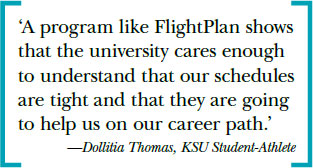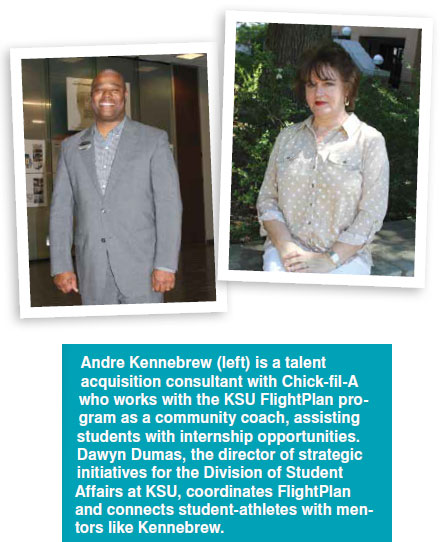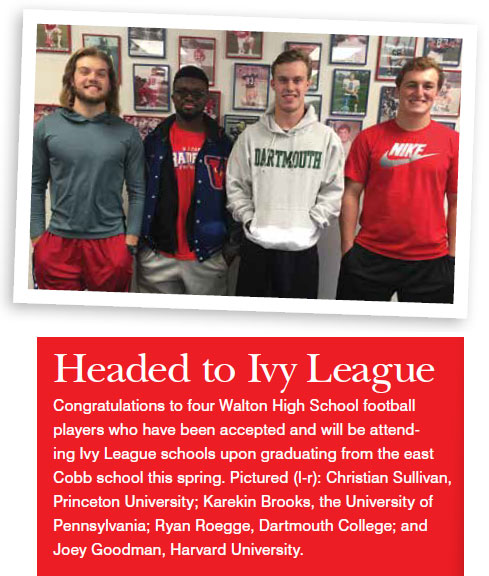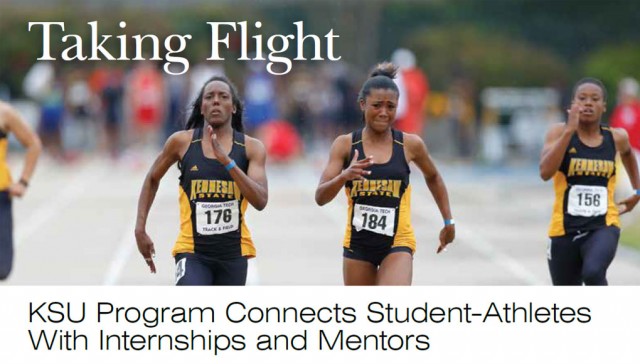KSU Program Connects Student-Athletes with Internships and Mentors
Dollitia Thomas says that without support from Kennesaw State University’s newly implemented FlightPlan program, the student-athlete may not have time to really narrow down which area of public relations she wants to focus on after graduation or look into internship opportunities this summer.
Launched last fall, FlightPlan is a four-year career plan for KSU student-athletes. Members of the university’s Division of Student Affairs play a vital role in connecting them with the metro Atlanta community for career support. Assistance ranges from job coaching, part-time job opportunities and internships.
A sophomore who competes on the KSU women’s track and field team in the 400-meter event, Thomas says she was inspired to major in PR after watching the movie “Hancock,” where a publicist is rescued by a reckless alcoholic superhero. The PR spokesman steps up to help improve the superhero’s image. “I like the idea of changing the public’s opinion and informing them about a certain situation,” Thomas says. “I like communicating, so for me, communicating to a mass audience about a company or a person is what I see myself doing. I also like social media and the Internet can be a great source for changing someone’s perspective of a situation or individual.”

With the help of FlightPlan advisors, Thomas has had opportunities to hear presentations from guest speakers in various professions, as well as look into internships for the summer.
“A lot of people don’t realize that we are doing two full-time jobs — as a student and an athlete — so we barely have the time to go out and look for opportunities like a regular student can,” Thomas says. “A program like FlightPlan shows that the university cares enough to understand that our schedules are tight and that they are going to help us on our career path and do whatever it takes to get us headed in the right direction, whether it’s just figuring out what we like or finding what internships there are for our major.”
Thomas’ season runs from January to May, but track and field student-athletes practice twice a day between August and May, once in the morning during weightlifting and each afternoon on the track with practices. She is one of about 400 student-athletes on KSU’s campus.
Dr. Randall Kennedy, assistant athletic director, says their goal is for all of KSU’s student-athletes to participate in FlightPlan, starting their freshman year — really thinking about what career paths they see themselves on after graduation. He looked into what many other schools are doing to implement similar programs and helped launch the program with these best practices in place.

“We are being much more proactive earlier on in the student-athlete’s career, and our focus really has been seeing our students get internships and making that a piece that really fits into their growth and development,” Kennedy says. “We’re not only in such a great location (in metro Atlanta), but it really stands on out a resume when someone has actual job experience, and a lot of people want to hire student-athletes because they bring such valuable skills — time management, competitiveness. When you pair that with them already having say, six months of experience, I think that really makes them stand out.”
Kennedy says they do have student-athletes who aspire to play professional sports after graduating from KSU, but the university connects these students with advisors who can have that conversation early on. “We are talking about what their life looks like after they play sports,” Kennedy says. “And even if they do go play professionally, you have to consider what happens after sports end and they still have to be focused on their career.”
“It’s more about helping them understand that they are utilizing their time. In the summer, when they may want to rest and relax, they should try and find an internship, part-time job or time to volunteer so that they can build their resume,” adds Katie Egloff, KSU associate athletic director.
As far as building relationships with the business community so that KSU can connect student-athletes with mentoring, internships or part-time jobs during their time off, that’s where Dawyn Dumas comes in as the director of strategic initiatives for the Division of Student Affairs at KSU, a collaboration between the athletics department and student affairs. “She’s a point person for the community,” Kennedy says. “She coordinates the FlightPlan database of individuals who have shown an interest and want to be a part of the program. She’s really someone who we funnel our students through to make those connections.” She also works with Michael Dutcher, assistant director of campus outreach, athletics and alumni engagement, who helps administer FlightPlan, in addition to meeting one-on-one with student-athletes to work on their resumes or help them practice job interview skills.
Dumas, who has a background in career services and program development, welcomed the opportunity, even though she had never worked with student-athletes before, she says. “I was intrigued … after meeting [Director of Athletics] Vaughn Williams for the first time and experiencing his contagious enthusiasm for student success, I was on board!”
She believes it’s important to have plenty of opportunities for student-athletes because they bring so much to a university campus and they can do the same for an employer. “They have had years of learning how to be a team player, manage their time and develop self-discipline, as well as enduring the rigors of practice and competitions,” Dumas says. “As a result, the college athlete has had little time to prepare for life after graduation — that’s where FlightPlan comes in to bridge the gap between the sport and career.”
Response from the metro Atlanta business community has been refreshing, adds Dumas. Community coaches have opportunities to spend one-on-one time with student-athletes, in addition to participate in FlightNight, which is an evening event where professionals are welcomed to the campus to speak to students about their career. “This is a program that makes a difference on our campus, as well as in our community,” she adds. “Most of our athletes want to stay here in our community and community connectors can make it happen. Without them, we would not have this program. I appreciate community connectors!”

Real-World Insights
Jerry Carbone, president of WC+G Adlogic in Atlanta, learned about the opportunity to serve as a KSU FlightPlan mentor during a KSU football last fall. His daughter is a freshman cheerleader at KSU and he noticed an advertisement during a game, so he asked around about it and was one of the first individuals from the business community to sign up.
He says a program like FlightPlan is important for student-athletes to take advantage of because it offers real-world insights into multiple careers and allows them to take what they’ve learned in school and apply it. “That’s the biggest thing we see with our interns,” he continues. “They have all of this knowledge, but they get to learn the day-to-day of an agency and the fast-pace of an agency, which is foreign to some of the kids. They need to be able to grab hold and navigate through the day … it’s the reality of the working world.”
Carbone recently gave a presentation to several KSU student-athletes, explaining what his job entails and speaking to participants from various sports programs about how to get into the advertising field. Carbone’s career began in retail marketing and advertising, working with big-named companies like Home Depot and Sports Authority; and about 10 years ago, he shifted his career path to start an ad agency, working closely with retailers, individuals and organizations associated with sports.
“I’m thrilled to be involved with FlightPlan, helping the kids learn some of the basics of everyday work life and going through some of the tips on interviewing and utilizing some of their skills from sports in the workplace, like being on time, always working hard, always wanting to do a little extra,” he says. “It’s a team-related environment in marketing in most cases and that’s another thing that gravitated me toward taking time to talk to college athletes.”
For Andre Kennebrew, a talent acquisition consultant at Chick-fil-A, participating in FlightPlan gave him an opportunity to work with Millennials.
“I think they have such potential. When you insert Millennials into the workforce today, they bring energy, they bring ideas, they just bring a lot, so with them doing that, why not work with them?” Kennebrew says. “I’m just impressed by this group of young people who are trying to make a difference. I’ve been impressed with the KSU students I’ve met, and I think it’ll be a great place to find some really talented people for the workforce in the future.”
As a former student-athlete who played football at Davidson College in North Carolina, Kennebrew says he remembers not having anyone there to support him as he tried to figure out what he would do after graduation. The opportunity to give back to student-athletes and help set them on the best career path was a win-win. “We want to help them prepare for the next stage of their lives, and we don’t even focus on them coming to Chick-fil-A, but helping them be successful,” he adds.
Opportunities for student-athletes at Chick-fil-A may include internships, but Kennebrew says they like to customize their work with the company. “The cookie-cutter approach to developing people doesn’t work as well to me, and student-athletes don’t really have an off-season, so you have to look at how you can work with them,” he says. “It could be job shadowing or working for a short period of time, and student-athletes have to be open to going and spending time in the workplace, and getting paid or how much they will get paid should be secondary to getting that experience.”
Entry-level openings at Chick-fil-A include IT or accounting, but Kennebrew says there’s also an opportunity for a student-athlete in the company’s franchise system. Upon graduating, a student-athlete could participate in a two-year apprenticeship with a franchise owner, followed by a two-year leadership program. “So, at about 26, someone could be a franchise owner of a Chick-fil-A,” he says. “And the average income for a Chick-fil-A operator is a little more than $200,000 a year, and they don’t have to worry about capital, cash flow or branding.”
Members of the business community interested in participating in FlightPlan or learning more about volunteer opportunities may contact Dumas at (470) 578-2423 or ddumas@kennesaw.edu.













